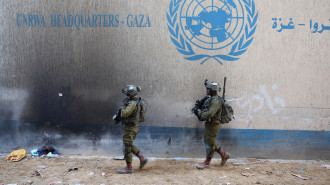'Future of women is the future of all': Iraqis stand up against crimes targeting women
"Raise your voices! Where are your voices? Raise your voices against killings of women, raise your voices for women!" exclaimed the scores of women and men at a demonstration in central Baghdad this month.
Activists gathered near the al-Mutanabbi Statue in downtown Baghdad on November 16, calling for the end to violence against women. Hundreds of others in the area joined the activists, reinforcing their outcry for women and freedoms of women.
Every year up to hundreds of women in Iraq are killed by men belonging to tribes. They accuse women of immorality and they proudly claim to possess them and their honour, while impeding them from any decision in life or free movement.
The protests were planned by the Organisation of Women’s Freedom in Iraq (OWFI), with demonstrators holding large red banners stating that tribal killings of women should be treated in the same way as the Anti-Terrorism Act. Activists said that these unjustified killings destroyed the woman’s family life and endangered her children for the rest of their lives.
"Every tribe man who takes a woman’s right to life must be punished - not defended or protected by the state," said activist and founder of OWFI, Inar Mohammed.
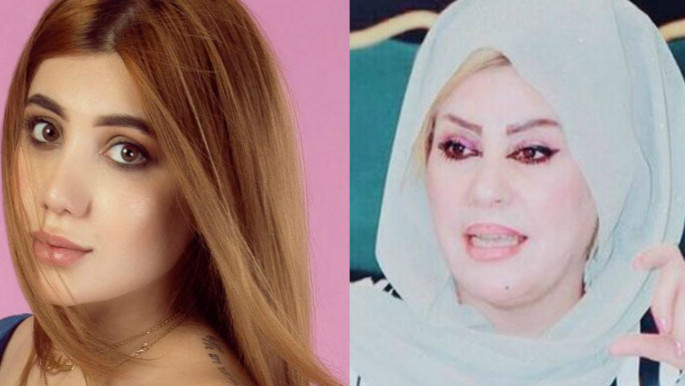 |
|
| Read also: The Iraq Report: Women's rights in danger after top activist and social media star assassinated |
"The state is collaborating with tribes in the killings of women under the guise of dishonour to society. We are here today against these tribal killings, against child marriages and against all violence women endure."
Inar Mohammad, together with her fellow friends and OWFI activists, are responsible for many shelters and safe spaces for women suffering from domestic violence or who receive death threats from families or tribes. The headquarter of the organisation is in the capital Baghdad and they also have four others branches in the country. The organisation was found in June 2003, three months after the beginning of the US invasion of Iraq.
Female activists felt the urgent need to challenge the growing patriarchal, tribal, and religious institutions gaining ground in Iraq. It then grew to combat all kind of violence and the rise of the extremist terrorist and misogynistic groups like the so-called Islamic State [IS] group.
Writer and activist, Ahlam al-Ubaidi, stands with a young girl during the demonstration. Grasping her shoulders, she starts to cry: "Can you see this girl? She is just 12-years-old. Can you imagine her marrying a man of 24? Double of her age? For us this is more than a crime, it is the rape of childhood, and is already a killing."
Ahlam has been an active participant in all women’s rights demonstrations and other civil society protests at Maydan Tahrir - a main gathering point which symbolises freedom in central Baghdad - since 2010. Although she has been threatened and insulted many times, it has not stopped her from protesting.
"I will continue to protest and cry until this country changes," she says.
At the same demonstration in Baghdad, activists from Erbil are also taking part. "We came from Erbil because this is one the most important demonstrations for all of Iraq," activist Kareem Bootane told The New Arab. "How can we rebuild Iraq if women continue to be killed?"
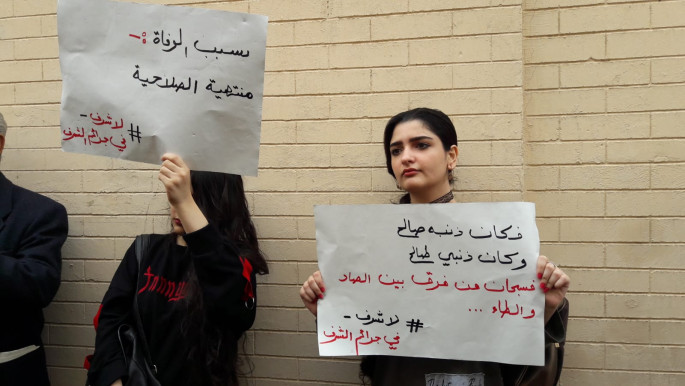 |
|
| Honour crimes cause death and are expired, read some of the banners [Marta Bellingreri] |
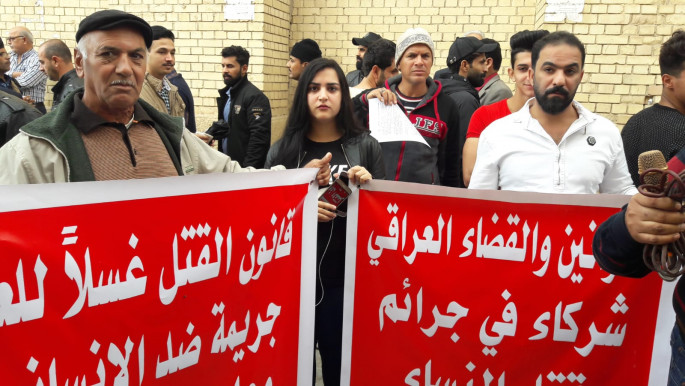 |
|
| Iraqi law and judges are complicit in crimes against women, read some of the banners [Marta Bellingreri] |
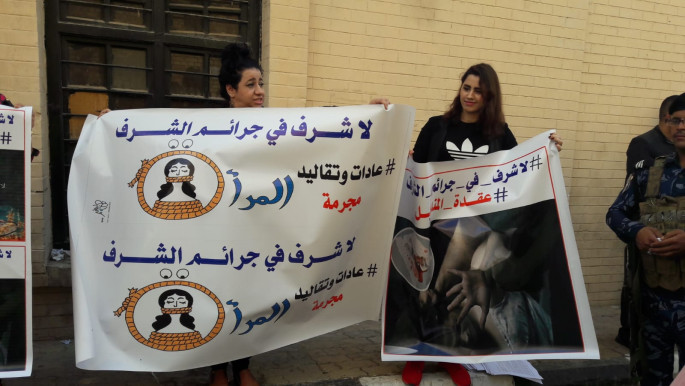 |
|
| No honour in honour crimes #CriminalCustomsAndTraditions, read some of the banners [Marta Bellingreri] |
Lawyer Mohammad Ju’a has been working on women’s cases for 12 years but highlights his frustration at being unable to protect or help them.
According to the Iraq’s Penal Code, law 409, number 111 of 1969, a rapist can avoid punishment by marrying his victim. On most occasions, the victim’s family accept this decision to "save the family’s honour."
"Crimes of honour are something crazy," Mohammad begins. "It is a crime and there is no honour in a crime. One of my clients committed suicide in Basra because she was raped, and her family wanted her to marry the rapist. Many other women like her in Iraq have no choice. We must fight for the future of Iraq by changing this law where a rapist or killer is protected, not the victim."
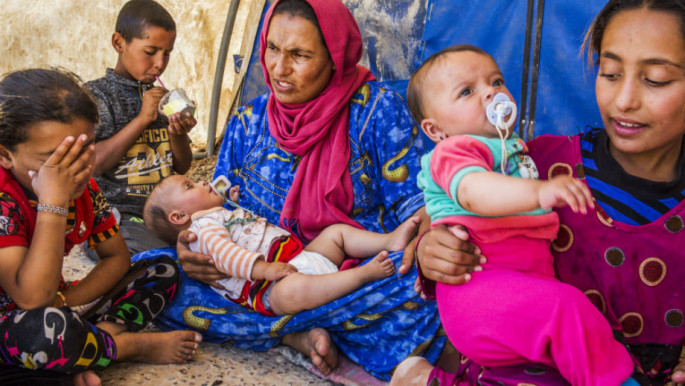 |
|
| Read also: Awaiting judgement: Meeting the Islamic State families held in desert camps |
In the last few months many women have been victims of honour killings or public shaming. This has increased even more since last May’s election campaign, resulting in an outcry and demonstrations.
Journalist Joumana Mumtaz denounced the public shaming cases against women, many of whom were then killed.
"I told the story of Tara Fares, a very famous Instagram star, six months ago," Joumana tells The New Arab. "I wanted to raise awareness about her case. She was risking her life and occasionally threatened only because she wanted to live her life as she wished. She was killed in September. Just being a woman in Iraq is enough of a reason to be killed."
The Baghdad protests clearly show how more and more Iraqis are condemning the ongoing violence against women, showing their support and taking the time to listen.
"In the end, the future of women is the future of all," Mohammad concluded.
Marta Bellingreri is a freelance researcher and writer, with a PhD focused on gender studies in the Middle East. Follow her on Twitter: @MartaDafne

![Palestinians mourned the victims of an Israeli strike on Deir al-Balah [Getty]](/sites/default/files/styles/image_684x385/public/2024-11/GettyImages-2182362043.jpg?h=199d8c1f&itok=xSHZFbmc)


![The law could be enforced against teachers without prior notice [Getty]](/sites/default/files/styles/image_684x385/public/2178740715.jpeg?h=a5f2f23a&itok=hnqrCS4x)
 Follow the Middle East's top stories in English at The New Arab on Google News
Follow the Middle East's top stories in English at The New Arab on Google News
